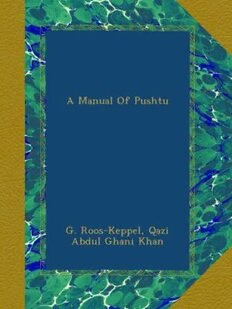Table Of Content.\WEUNI\ -^IIIBRARY^/
'<fiiaDNV-sov^^^ y/smmi^^'" ^ojiwd-jo"*^
SMElfjv. ^^OF-CAllFOfi'^
JJliliiivSOi- ^'S^JAINH3V\V
"V. AWtUNIVtKVA
1 1f
o
'EUNIVERS/A
<ri130NYS01^"
^IIIBRARYO/
1^
'toUVD-dOV" ^J^JUDWSOV^^ %Sa3AINn-3Uv'
^.OfCAllfO%
^^^AavaaiH^"^
^!rtt•tiNlv^Ki•/A
o
^ .5!rtEUNIVER% ^lOSANCflf/^ 0/.
o
^m
.^WrUNIVER% ^lOS|ANCEl£r^ s
%
ii(?=
^TilJOKVSOV^"
AYif
-#.
'^-SOJIIVJJO'^ %0jii7jiv' '-fiij;'i ;ti>
>i,OF-CAllFO% ^of-CAiifr
^f?Aav«8n-i>N'^ .\\v
\OtUNIVtKi/A ^O/r
12^
15^)1
%7^ wmi^
\)sm\ms//;t, ^m^.nws:.
MNOIWV
xMLIBKAKr^;/
\i ^
-<
^^OJIIVJJO'^ 'OUJiiVJ i^->
I
MANUAL OP PUSHTU
Major G. ROOS-KEPPEL
c.i.e., f.kg.s., i.s.c.
POLITICAL OFI'ICKE KUYBER PASS PRESIDKNT CENTRAL COMMITTEEOF
EXAMINATI;ON IN PUSHTU
AND
QAZI ABDUL GHANI KHAN
MUXSHI OF PESHAWUR
ASSISTED BY
SAHIBZADA ABDUL QAYUM,
k.b.
ASSISTANT POLITICAL OFFICER KHYBER PASS MEMBER CENTRAL COMUITTH!
OF EXAMINATION IN;PUSHTU
HUMPHREY MILFORD
OXFORD UNIVERSITY PRESS
London Editiburgh Glasgow Copenhagen
New York Toronto^ Melbourne Cape Town
Bombay Calcutta Madras Shanghai
r
(^K,
Fifth Impression, 1922
PRINTED IN EXGLAKD
i\ h'^jrr^
AUTHOE'S PREFACE.
Since I have been President of the Central Com-
mittee of Examination in Pushto, I have had
many inquiries from students of the language
as to what books they should get, and whether
1 could recommend any guide or manual giving
a progressive course of lessons and based on the
» requirements of the Lower and Higher Standard
Examinations. I have examined every book I
could get hold of on the subject, and have not
succeeded in finding what my correspondents ask
-)for, and the idea has thus been suggested to me to
produce a manual modelled on '' Clarke's Persian
Manual," which, with the official text books (the
Ganj-i-Pulch^o and Tarikh-i-Mahmud-i-Ghaznavi)
and a dictionary, will enable a student to study
IV AUTHOR S PRErFACE.
tlie language with the assistance of any fairly
intelligent Pathan he may come across, even if
he is unable to procure the services of n, trained
Munshi.
There have been up to date three Pushtu Gram-
mars published, viz., Trumpp's (1873), •Ravert^y's
(1860), and Bellew's (1867). They are expen-
sive, not easily obtained, and are far above the
heads of beginners. Besides, they are grammars
pure and simple, and in no sense " Guides " or
" Manuals."
Before writing the short grammar which forms
Part T. of this book I studied these grammars
very carefully, and take this opportunity of ex-
pressing my indebtedness to their authors.
Major Raverty, the author of the grammar,
<
has also produced a " Pushto Manual," but it
is -written throughout in the Roman (Jiaracter,
which detracts very much from its value, as no
two people agree as to the transliteration of
Pushtu.
In addition to the above, many Munshis' in
India have published Pushtu "^Guides," " Vo-
cabularies," " Phrase-books*' and '*' Sentences."
AUTHORS PREFACE. V
4
Those which I have examined have appeared to
me to be valueless. They consist of masses of
words, seiitences and phrases strung together
•indiscriminatelv.
Twenty, and even ten year'^ ago, Pushtu was
looked upon as an exceedingly difficult language.
Few Europeans attempted to learn it, and the
teaching was in the hands of three or four
Munshis in Peshawar. Within the last ten years,
however, there has been a great rush to learn
Pushtu, and to meet the demand the number
of Munshis has increased out of ail proportion.
The number of really good Pushtu teachers in
the Punjab could almost be counted on the
fingers of one hand, but every fairly educated
rtian who has a smatterino- of Eno-Ush and Pushtu
considers himself qualified to set up in business
as a Munslii. Very few of these last have any
knowledge of grammar or of teaching, and the\'
aye only capable of giving the meanings of words
and phrases in the text-books, and of correctmg,
after a f?^shion, the student's compositions. They
are useful enowgl* for these purposes, but learning
under such tuition is arslow business.
6
—
,;
VI AUTHORS i^KEFACE.
I hope this Manual will, by supplying a sys-
tem, enable the student to get better results than
before. t
The student should be particular to Iparn h:3
pronunciation frpm a genuine Pathan. If his
Munshi is a Pathan by birth, so mu6h the better
but to many of the Munshis I have met Pushtu
is a foreign language, and although they can in
most cases talk fluently enough, their pronuncia-
tion is sometimes vile. Unless his Munshi is a
Pathan, the student is advised to read the short
phrases in the examples and exercises of Part 11.
Chapter I., and the "colloquial sentences" of
Part HI. over to his orderly, his chokidar, or to
any other Pathan he may have in his service, and
to make him repeat the phrases after him, cai<j-
fully noting the pronunciation. There are few
places in Northern India where a'>Pathan (a
retired Sepoy for choice) cannot be got on a small
wage to practise on.
t
The Manual is divided into three parts :
Part I. A concise grammar, original as far as it
is possible for a grammar to, be so, digested
from every otherwork onthe subjectavailable.

